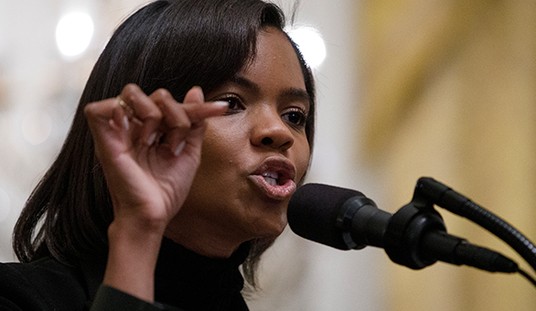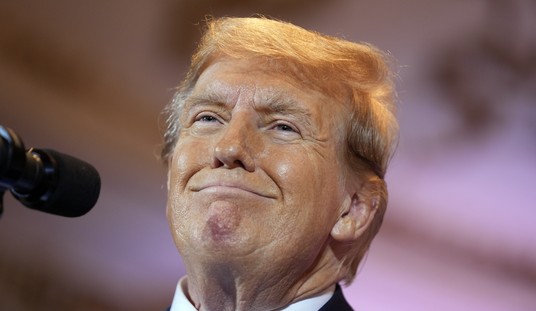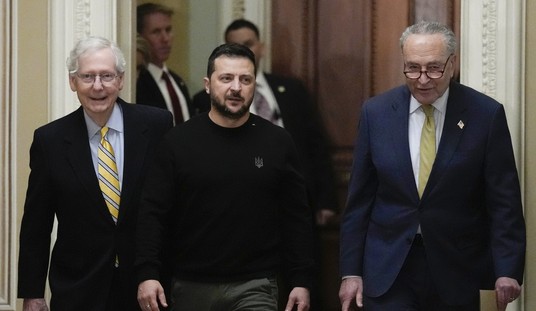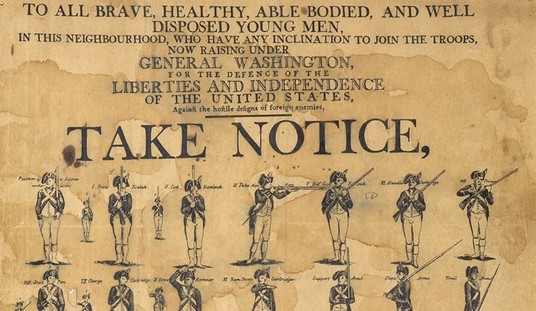
Sadrist lawmakers chanting and raising placards reading: “No, no to the agreement” react in Iraq’s parliament in Baghdad, Thursday, Nov. 27, 2008, as lawmakers vote to approve a security pact with the United States that lets American troops stay in the country for three more years – setting a clear timetable for a U.S. exit for the first time since the 2003 invasion. The vote in favor of the pact was backed by the ruling coalition’s Shiite and Kurdish blocs as well as the largest Sunni Arab bloc, which had demanded concessions for supporting the deal. The Shiite bloc agreed to a Sunni demand that the pact be put to a referendum by July 30, meaning the deal must undergo an additional hurdle next year. Under the agreement, U.S. forces will withdraw from Iraqi cities by June 30 and the entire country by Jan. 1, 2012. Iraq will have strict oversight over U.S. forces. (AP Photo/APTN)
Shouting ‘Allahu Akbar,’ the Iraqi Parliament has passed a resolution directed the Iraqi government to expel all foreign troops from Iraq. The resolution was brought on by the killing of Iranian thug Qasem Soleimani on a Baghdad highway last Thursday.
“Yes,yes Abu Mahdi Al-Muhandus”
“Yes,yes Soleimani”
“No,No America”
“No,No Israel”
MPs are chanting inside the hall. pic.twitter.com/t4brkHuVwR— Mustafa Salim (@Mustafa_salimb) January 5, 2020
Iranian lawmakers chant “death to America”
pic.twitter.com/YYjMCQFqCW— Daily Caller (@DailyCaller) January 5, 2020
This has been long in coming. Barack Obama had promised a withdrawal in 2009 and the lackadaisical and passive-aggressive way in which his administration failed to negotiate a Status of Forces Agreement seemed to guarantee that would happen. To be clear, I though this was dunderheaded at the time because in 2008-2009, in my view, we had the opportunity to lock in the hard-won gains of The Surge and create a pro-west bulwark against Iranian adventurism. But the strategy of the Obama administration in the region was predicated upon creating a regional superpower out of Iran as, I believe, a counterweight to Israel and to the United States, itself, under future administrations.
The fight against ISIS ended up forcing us into a very peculiar position. The Iraqi Parliament is dominated by Iranian stooges and hirelings–the vote today was boycotted by Sunni and Kurd members in protest–the Iraqi Army, which we mostly fund, has absorbed into its command structure the Iranian-owned militias operating under the Popular Mobilization Forces (PMF) banner which means we are supplying Iranian proxies with war materiel and, in some cases, we are advising and training them. All the while, Iran has continued to strike against US forces, US interests, and US allies in the region.
The bizarre status quo in Iraq was not and is not sustainable.
Some Obamanauts are claiming that this is win a win for Iran.
The Iraqi parliament vote to expel US troops is a major win for Iran. Just one piece of fallout against our interests by @realDonaldTrump decisions.
— Wendy R. Sherman (@wendyrsherman) January 5, 2020
One can’t disagree with that assessment, but as I said, the win was locked in for Iran in 2009. There is, though, an underlying fallacy in that argument. To what extent did US military presence in Iraq actually contribute to improving the security situation for the US in the region. Right now the US forces in Iraq fall into basically two groups: targets and potential hostages. No one has yet to explain why fighting ISIS is anything more than a progressive exercise in virtue signaling using the blood of US troops to prove their seriousness or how the fight against ISIS hasn’t reduced us to the role of proxies of Tehran. It is Tehran who his threatened by ISIS, not us, personally, I’ve stocked up on popcorn to enjoy the spectacle of one group of anti-American Islamists killing another group of anti-American Islamists.
The real question is what does this resolution mean? Your guess is as good as mine. In the short run it means US firepower will not be available to help Iraq fight ISIS. As ISIS is spent force, I really don’t see this as a big deal.
The resolution doesn’t actually end US military presence and there is no guarantee the Iraqi government will move to act on the resolution.
JUST IN: The Iraqi parliament has voted to order the departure of U.S. forces. They're in Iraq at the invitation of the Iraqi government to fight ISIS, so this would rescind that request.
However, it’s not binding and needs to be approved by the Iraqi government.
— NPR (@NPR) January 5, 2020
Iran has their propaganda victory, I expect that they will try to have their cake and eat it, too, by continuing a US military presence as a way to lay off the operational costs of the Iraqi Army and Tehran’s regional ambitions onto the American taxpayer. Recall that we’ve already withdrawn completely from Iraq once before:
The US suffered a major diplomatic and military rebuff on Friday when Iraq finally rejected its pleas to maintain bases in the country beyond this year.
Barack Obama announced at a White House press conference that all American troops will leave Iraq by the end of December, a decision forced by the final collapse of lengthy talks between the US and the Iraqi government on the issue.
The Iraqi decision is a boost to Iran, which has close ties with many members of the Iraqi government and which had been battling against the establishment of permanent American bases.
Obama attempted to make the most of it by presenting the withdrawal as the fulfilment of one of his election promises.
“Today I can report that, as promised, the rest of our troops in Iraq will come home by the end of the year. After nearly nine years, America’s war in Iraq will be over,” he told reporters.
For the US the bottom line is simple. We are subsidizing a state sponsor of terror by our presence and military assistance program. We have too few troops in Iraq to exert any kind of cultural or economic or political influence. The small number of troops makes them very vulnerable to hostile action. No one, anywhere, has any idea of what we are doing in Iraq or why we are there that involves a benefit to the US and not to Iran.
The Iraqi Parliament has voted US troops out of Iraq. That is their prerogative. The US Congress should cement the deal by requiring US troops to leave an to cease all funding and training of the Iraqi armed forces.













Join the conversation as a VIP Member